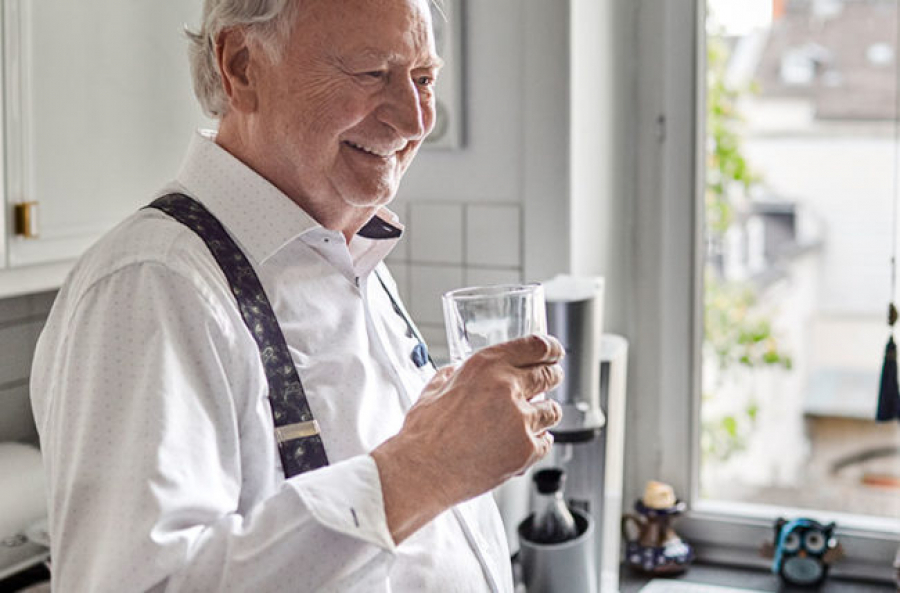If you have Parkinson's disease you may feel overwhelmed by dietary advice.
Some sources may tell you to eat certain foods and avoid others. Some may even claim that specific foods are miracle cures for your symptoms. How do you know what to believe?
Neurologist Michal Gostkowski, DO, says some of the information about Parkinson's disease and foods is based on outdated or inaccurate research, or may not have any science to back it up.
But there are some solid tips when it comes to your diet. Dr. Gostkowski explains what you should know about the foods you eat.
Forget beans for Parkinson's
Fava beans contain an amino acid known as levodopa. Levodopa is an active ingredient in some Parkinson's medications. Sounds like a good reason to eat a lot of beans, doesn't it?
No. Dr. Gostkowski explains that the amount in the beans is small compared to what's in the drugs. "You can't eat enough beans to have any effect on symptoms", he says.
Bananas also contain levodopa, Dr. Gostkowski says. But, like fava beans, it's not possible to eat enough bananas to affect PD symptoms. By all means, if you like beans or bananas, enjoy them! But don't overdo it or expect them to work like medicine.
Eat a variety of fruits, vegetables, legumes and whole grains to maintain balance.
Eat plenty of protein, but not with levodopa medications.
If you are taking a levodopa medication, your doctor may tell you to avoid protein when taking your medications. Both animal and vegetable protein can interfere with the absorption of levodopa-containing medications.
But you should still eat plenty of protein. Just be strategic over time. "Don't take levodopa medications with meals," Dr. Gostkowski says. "It's best to take it on an empty stomach, either 30 minutes before a meal or one hour after eating".
If you feel nauseated from the medicine, eat a small amount of starchy foods, such as crackers. Make sure whatever you eat with your medication does not contain protein. "It's a misunderstanding that people with Parkinson's should avoid protein", Dr. Gostkowski says.
"You definitely need protein in your diet, just don't eat it when you're taking your levodopa medication"
Increase fiber intake
A diet rich in fiber is a proven way to avoid constipation, a common problem for people with PD. In the expert's view, "Parkinson's can slow down the bowels and cause constipation" "Fiber helps keep things moving." There are many fiber-rich foods, so pick your favorites. Women should aim for 25 grams of fiber per day and men should consume 38 grams.
Raise a glass of water
Fiber alone won't solve a constipation problem, so drinking plenty of water is critical. "Drink several glasses of water a day" "Constipation is worse when there is not enough water in the intestines" And focus on pure water, not other beverages. "Liquids such as coffee or sports drinks are not the same as water. Drink six to eight glasses of water a day, with nothing added", the doctor says.
Dr. Gostkowski understands that this is often easier said than done. "Many people who have Parkinson's avoid drinking water because they have trouble going to the bathroom", he says.
To help avoid this challenge, Dr. Gostkowski recommends:
Drink water in the morning and afternoon to avoid the urge to urinate in the evening
Plan to go to the bathroom at set times to get there before you feel the urge to go urgently
Pass the salt?
Most health advice today says to cut back on salt intake. A high-sodium diet can cause high blood pressure, a potentially serious condition. But PD can cause the opposite problem in some cases, "Many people with Parkinson's have orthostatic hypotension" Gostkowski comments. "This drop in blood pressure occurs when you get up from sitting or lying down. Your heart and blood vessels don't respond as quickly as they should, which makes you feel dizzy or faint. You can fall and injure yourself".
Eating more salt can help with orthostatic hypotension, but don't fill your diet with processed foods like potato chips, instead, add salt to nutrient-rich foods like vegetables and whole grains. Check with your primary care physician before you start eating more salt, if you don't have orthostatic hypotension, you may need to limit sodium to no more than 2300 milligrams per day, the expert said.
Combine exercise with diet
Dr. Gostkowski says that if you want to feel your best, you should combine a healthy diet with exercise, and research has shown that regular exercise can improve PD symptoms.
It is essential to do exercises that raise the heart rate, at least 30 minutes a day, five times a week, without worrying about specific exercises, you should do an activity that you can enjoy, as long as they do not affect the heart rate, walking briskly is a good option, riding a bike or doing more advanced exercises for veteran athletes are a good option, it is also advisable to see an occupational therapist so that he can administer an exercise program according to your needs, are some of the recommendations of the expert.
Add medications for a winning combo
Diet and exercise are important to control PD, but don't forget about medications, take them regularly and exactly as prescribed by your doctor.
If you tend to forget your medication, set an alarm to remind you, in turn you can use a pill box that is labeled with the days and times of day, "Take your medications on a set schedule, don't skip doses or double up" "When you are diligent about taking your medications and following a healthy lifestyle, you will feel better", recommends Dr. Gostkowski.
 English
English  Español
Español 
